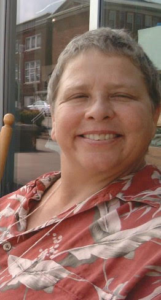Lynch Law Must Go!: Toward A Reparative, Antiracist Archive of Racial Terror Lynching in Maryland
Setting the Foundations: Black Women’s Labor as a Cornerstone of Oral History at US Institutions
Security Concerns for Tenant Narrators
Meta-Methodologies of Oral History Knowledge Succession
Worker-led Survey & Solidarity Project
Georgia Dusk: A Southern Liberation Oral History
Norwood Community Archives’ Natural Historians Program
Narrating Through the Carceral Divide
AAPI Oral History Collection of Milwaukee, Wisconsin’s Chinese Chapter
Voices of West Baltimore
Black Folk and Our Food: Extracting Traumatic Memory Hidden in Unwritten Family Recipes through Oral Histories
______________________________________________________________________
Lynch Law Must Go!: Toward A Reparative, Antiracist Archive of Racial Terror Lynching in Maryland:
The “Lynch Law Must Go!” Project is a multidirectional collaborative grounded in oral history, public history, digital humanities, and hyperlocal, policy-driven reconciliation and reparations. Our team, comprised of scholars and non-scholars alike, is bound together by a shared commitment to the Maryland Lynching Truth and Reconciliation Commission—the first and only task force in the United States that is mandated by state law to identify and investigate cases of racial terror lynching, hold public truthtelling hearings in localities, and make subsequent policy recommendations. We are deliberately privileging testimony from lineal and collateral descendants, firsthand and second eyewitnesses, and Black Marylanders more broadly who wish to speak to the more than 40 documented racial terror lynchings carried out by white mobs in the state of Maryland from 1854-1933. Secondary interviewees include scholars, local historians, activists, politicians, and descendants of lynching perpetrators and accusers. The project is a model for how oral history, Black community archiving, and the recovery of concealed records from state and local jurisdictions are essential toward (re)constucting an antiracist counter-narrative on lynching in Maryland (and beyond). While our immediate charge is narrative change, this project further confronts issues that oral historians have not always eagerly entertained: transgenerational trauma and retraumatization, truly democratized practice, interviewee and interviewer compensation, post-custodial ownership and authority, and whether oral history can constitute, forward, and/or detract from emotional, intellectual, and financial reparations.
Project Leaders:
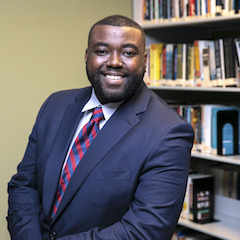 Dr. Charles Chavis is a professor, historian, writer, producer, and peacebuilder. At George Mason University, Dr. Chavis is the Director of African & African American Studies, the Founding Director of the John Mitchell, Jr. Program for History, Justice, & Race at the Jimmy and Rosalynn Carter School for Peace and Conflict Resolution, and Assistant Professor of History and Conflict Resolution. He is the National Co-Chair for the United States Truth, Racial Healing, and Transformation Movement (USTRHT), Vice-Chair for the Maryland Lynching Truth and Reconciliation Commission, and he is on the Advisory Committee for PBS’s Exploring Hate. Chavis’ work focuses on the history of racial violence and civil rights activism and Black and Jewish relations in the American South, and the ways in which historical understandings of racial violence and civil rights activism can inform current and future approaches to peacebuilding and conflict resolution throughout the world. He is the editor of For the Sake of Peace: Africana Perspectives on Racism, Justice, and Peace in America (Rowman & Littlefield, 2020), and his most recent publication is The Silent Shore: The Lynching of Matthew Williams and the Politics of Racism in the Free State (Johns Hopkins University Press, 2022). Dr. Chavis is also the producer and co-writer of a documentary series: Hidden in Full View.
Dr. Charles Chavis is a professor, historian, writer, producer, and peacebuilder. At George Mason University, Dr. Chavis is the Director of African & African American Studies, the Founding Director of the John Mitchell, Jr. Program for History, Justice, & Race at the Jimmy and Rosalynn Carter School for Peace and Conflict Resolution, and Assistant Professor of History and Conflict Resolution. He is the National Co-Chair for the United States Truth, Racial Healing, and Transformation Movement (USTRHT), Vice-Chair for the Maryland Lynching Truth and Reconciliation Commission, and he is on the Advisory Committee for PBS’s Exploring Hate. Chavis’ work focuses on the history of racial violence and civil rights activism and Black and Jewish relations in the American South, and the ways in which historical understandings of racial violence and civil rights activism can inform current and future approaches to peacebuilding and conflict resolution throughout the world. He is the editor of For the Sake of Peace: Africana Perspectives on Racism, Justice, and Peace in America (Rowman & Littlefield, 2020), and his most recent publication is The Silent Shore: The Lynching of Matthew Williams and the Politics of Racism in the Free State (Johns Hopkins University Press, 2022). Dr. Chavis is also the producer and co-writer of a documentary series: Hidden in Full View.
 Jack Del Nunzio is a public and academic historian of racial terror lynching and racial capitalism. He serves as Public Historian and Oral History Coordinator with the John Mitchell, Jr. Program for History, Justice, & Race at George Mason University, and he is the Project Manager for the Maryland Lynching Oral History Initiative. In these capacities, Del Nunzio designs and supports projects that are reparative, democratized, culturally responsive, trauma-informed, and disruptive to white supremacist narratives and structures. Del Nunzio is also the United States Lighthouse Society’s Researcher and Archivist for the Baltimore-Washington region, and he is part of the research team for a forthcoming academic text on Black Galvestonians’ resistance to white normative representations and narratives of space in Galveston. Del Nunzio is a recent graduate of American University’s Public History MA Program, and he holds a BA in History and Economics from McDaniel College.
Jack Del Nunzio is a public and academic historian of racial terror lynching and racial capitalism. He serves as Public Historian and Oral History Coordinator with the John Mitchell, Jr. Program for History, Justice, & Race at George Mason University, and he is the Project Manager for the Maryland Lynching Oral History Initiative. In these capacities, Del Nunzio designs and supports projects that are reparative, democratized, culturally responsive, trauma-informed, and disruptive to white supremacist narratives and structures. Del Nunzio is also the United States Lighthouse Society’s Researcher and Archivist for the Baltimore-Washington region, and he is part of the research team for a forthcoming academic text on Black Galvestonians’ resistance to white normative representations and narratives of space in Galveston. Del Nunzio is a recent graduate of American University’s Public History MA Program, and he holds a BA in History and Economics from McDaniel College.
Setting the Foundations: Black Women’s Labor as a Cornerstone of Oral History at US Institutions:
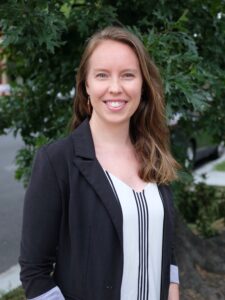
“Setting the Foundations” will produce a journal article and conference presentation contributing to the growing literature and discussions recognizing more complex histories of the field. It centers Black women’s labors in early institutional oral history projects/programs by focusing on individuals in pivotal roles at universities in the early- and mid-1900s, and at community-based institutions even earlier. By specifically focusing on Black women, this project emphasizes their roles in establishing, “professionalizing,” and advancing oral history as a methodology and field. It highlights Black women working simultaneously alongside and in resistance to Whiteness, disrupting dual notions that institutional oral history’s origins were primarily White and primarily male.
Project Leader:
Anna F. Kaplan, PhD, (she/her) is a scholar and oral historian in Washington, DC. She earned her History PhD from American University and Oral History and Anthropology MAs from Columbia University, studying memory and race in the US South. She has worked on projects with the National Park Service, the DC Oral History Collaborative, Smithsonian Institution museums, and the US State Department. In addition, she teaches at American University and University of the District of Columbia, and serves in leadership positions for Oral History in the Mid-Atlantic Region and the OHA’s Diversity Committee and Equity Audit Task Force. Read more: https://annafkaplan.wordpress.com/.
Security Concerns for Tenant Narrators:
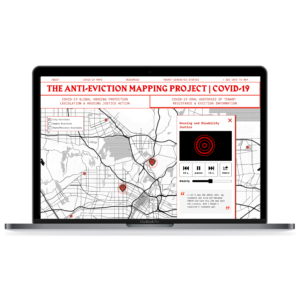
At AEMP we have grappled with how to provide our narrators with security as they face the possibility of retaliation by landlords. These security concerns often disproportionally affect those who are undocumented, BIPOC communities, children, and the differently-abled, While the experiences of these tenants and their stories are imperative to the framework of local and national histories, their telling must be weighed against the potential negative impacts on narrators.
This grant will allow us to continue these inquiries into methodologies that preserve narrator privacy. Our findings will be integrated into the larger AEMP Oral History Handbook and allow these vital practices to become sustainable with our volunteer cadre and to be shared with others in the field who work with narrators facing privacy and retaliation concerns, especially as they intersect with issues of equity.
Project Leaders:
Alexandra Lacey is an oral historian who has worked for 15 years as an independent filmmaker and for the last 6 years with AEMP as a media producer and oral historian.
María Velázquez is a PhD Candidate at the University of Wisconsin-Madison. Her work draws attention to the social conditions of tenant housing and how it shapes the livelihoods of minoritized families and has implications for schools and educational policy. She is part of the Anti-Eviction Mapping Project collective and supports the Oral History team, particularly in the Bay Area.
Brett Halperin-a designer, researcher, and PhD student in Human Centered Design & Engineering at The-University-of-Washington who is working on designing and developing oral histories for usability, accessibility, and sustainable preservation.
Luis Trujillo-a PhD candidate in Ethnic Studies at the UC Riverside who is a constitutive member of the Northeast LA Alliance working to pursue solutions to the displacement crisis that promotes a de-marketizing of land and homes.
VIEW THE NEW HANDBOOK SECTION HERE!
Meta-Methodologies of Oral History Knowledge Succession:
This interview project applies oral history methodologies to document and pass on “the history of oral history” and focuses on the voices and experiences of oral historians in Kentucky and Central Appalachia. Interview participants will include diverse demographic representation of practitioners and projects. Interview questions will address critical access to professional training, mentorship, and resources; their topics of interest; their positionalities and experiences in relation to learning and practicing oral history methodologies; their observations and recommendations regarding the professional field; and their visions for how oral history contributes to understanding the region and the world. The University of Kentucky Louie B. Nunn Center for Oral History will serve as the permanent repository for this oral history collection, which will be available for public access and presented in community-based and scholarly venues.
Project Leaders:
Timi Reedy and Dr. Tammy Clemons are certified Kentucky Community Scholars who share a commitment to justice, ethical documentation, and inclusive representation of marginalized communities. Timi has conducted interviews for several audio, oral history, and research projects for more than two decades. Tammy is a cultural anthropologist and documentarian who conducted ethnographic/oral history interviews and fieldwork with media education programs in Eastern Kentucky and West Virginia as part of her dissertation research. Both have completed human research training through the Collaborative Institutional Training Initiative Program, and they co-produce a multimedia documentary featuring oral history interviews, audiovisual recordings, photographs, news clippings, and other artifacts. Most recently, they both served as in-kind consultants and administrative support for Appalachia—Science in the Public Interest’s “Creative Aging & Lifelong Learning” interview project funded by an Arts Access Assistance Grant from the Kentucky Arts Council and National Endowment for the Arts.
Worker-led Survey & Solidarity Project:
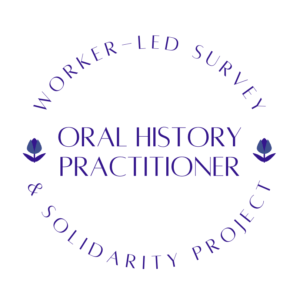 The Worker-led Survey & Solidarity Project follows movements led by workers in other fields––such as museum workers, archivists, and arts professionals––to instrumentalize salary and wage transparency to expose pay disparity where it exists, to foster solidarity through understanding of peer worker conditions, and to advocate for change. In addition to pay, the research conducted via survey will also address practitioner demographics, workplace discrimination and inclusivity, accessibility for disabled practitioners, options for caregivers and working-class practitioners, and practices that either adversely impact or support the ability of practitioners to remain at their jobs or in the field as a whole. The outcome of this research will be a white paper alongside a public forum to activate and respond to the survey findings. You can find the full PDF of the white paper HERE.
The Worker-led Survey & Solidarity Project follows movements led by workers in other fields––such as museum workers, archivists, and arts professionals––to instrumentalize salary and wage transparency to expose pay disparity where it exists, to foster solidarity through understanding of peer worker conditions, and to advocate for change. In addition to pay, the research conducted via survey will also address practitioner demographics, workplace discrimination and inclusivity, accessibility for disabled practitioners, options for caregivers and working-class practitioners, and practices that either adversely impact or support the ability of practitioners to remain at their jobs or in the field as a whole. The outcome of this research will be a white paper alongside a public forum to activate and respond to the survey findings. You can find the full PDF of the white paper HERE.
Project Leader:
Sarah Dziedzic is an oral historian, project consultant, teaching artist, and workshop facilitator based in New York City. Alongside community-based cultural worker Jess Lamar Reece Holler, sheco-develops Equity Budgeting, an approach to creating budgets for cultural projects, and was co-chair of the Independent Practitioner Task Force of the Oral History Association, where she worked to establish fair labor standards and build solidarity among oral historians and other cultural workers. She graduated from Columbia University’s Oral History MA program in 2011, and came to oral history with a background in libraries and environmental education.
Georgia Dusk: A Southern Liberation Oral History:
Georgia Dusk is an intergenerational oral history of Georgia’s ongoing southern liberation movements documenting Black, queer, and feminist grassroots organizers and cultural workers. We trust that marginalized people are the experts of their own stories and leaders of their liberation. The oral history interviews enable participants to reclaim the narrative and historical representation of movement and cultural work throughout Metro Atlanta to build our futures. By building a community archive in the form of oral history, Georgia Dusk is building a collective information-building process with contributions from all generations.
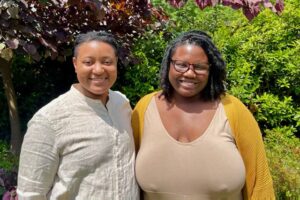 Project Leaders:
Project Leaders:
Ashby Haywood is a Black queer memory worker from the South. She is a full-time assistant librarian and archivist at the Highlander Research and Education Center. Ashby is an advisor and interviewer for the Georgia Transgender Oral History Project.
Dartricia Rollins is a Queer, Black, Southern organizer and cultural worker. Dartricia is the Assistant Director of Charis Circle, and a bookseller at Charis Books and More. She serves on the Board of Directors at Access Reproductive Care-Southeast, a member of the Black Alliance for Peace, and the PSL.
VIEW THE HANDBOOK FOR COMMUNITY-EMBEDDED ORAL HISTORIES HERE!
Norwood Community Archives’ Natural Historians Program:
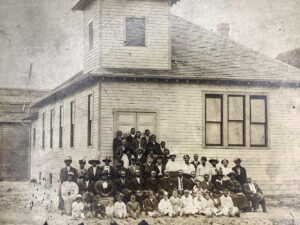
The goal of the Natural Historians Program is to learn from and with the descendants of the US Colored Troops in the Southeast quadrant of Indianapolis. Unearthing the history of this area created a cultural revival that allows the USCT descendants to tell their stories, using their own voices. Through both oral histories and family archives, the Natural Historians Program will give descendants paid opportunities to build the Norwood Community Archives from its very first stages of its development. The oral history program will train and partner descendants with community historians and writers to lead them through the process.
Project Leaders:
The Norwood Community Archives is a grass-roots effort to preserve the legacy of the US Colored Troops in the Southeast quadrant of Indianapolis as development threatens to push them from their ancestral homes. Initially formed by Ms. Flinora Frazier, matriarch of Norwood, and community historian, Kaila Austin, the archives consist of family collections and oral histories as told by the descendants of the USCT. The archives span the undocumented history of the quadrant as the hunting grounds of the Delaware Indians to its formal colonization in 1820s and its transition into a Freetown in the years following the Civil War.
Narrating Through the Carceral Divide:
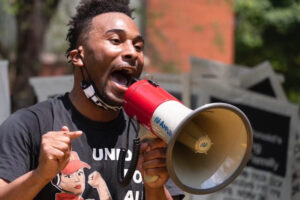 As prison abolition is increasingly debated, it is apparent that there are significant structural barriers preventing those most impacted by mass incarceration from having their perspectives heard and respected. Given this and oral history’s social justice commitments, we seek to understand the many barriers that prevent those most impacted by mass incarceration from participating in and leading audio-based storytelling projects. We will achieve this by talking to project managers and participants who have been a part of audio-based storytelling projects that center the perspectives of and give production power to people most impacted by mass incarceration. Our deliverable to the OHA/NEH is a “White Paper” describing the state of this field, the barriers created by the bureaucracy and dehumanization of the carceral system, tips and information that we learned about navigating this carceral bureaucracy, and potential policy changes to decrease these barriers.
As prison abolition is increasingly debated, it is apparent that there are significant structural barriers preventing those most impacted by mass incarceration from having their perspectives heard and respected. Given this and oral history’s social justice commitments, we seek to understand the many barriers that prevent those most impacted by mass incarceration from participating in and leading audio-based storytelling projects. We will achieve this by talking to project managers and participants who have been a part of audio-based storytelling projects that center the perspectives of and give production power to people most impacted by mass incarceration. Our deliverable to the OHA/NEH is a “White Paper” describing the state of this field, the barriers created by the bureaucracy and dehumanization of the carceral system, tips and information that we learned about navigating this carceral bureaucracy, and potential policy changes to decrease these barriers.
Project Leaders:
Troy Gaston (he/him, former Robert Taylor Homes resident) is an organizer with Black Lives Matter, and a McNair Scholar in his last semester for his Political Science and Legal Studies degree. He is applying to Ph.D. programs to continue his research, which centers Black women in communities where Black men are taken by the carceral system, with particular emphasis on community within the Robert Taylor Homes.
Colette Payne (she/her, former Ida B. Wells Homes resident) is also finishing her undergraduate degree, and will graduate from the University Without Walls program at Northeastern Illinois University with her degree in Women, Incarceration, and Change. She has worked in advocacy and policy related to incarcerated women for nearly 8 years, first with Chicago Legal Advocacy for Incarcerated Mothers, and now as the Director of the Reclamation Project for the Women’s Justice Institute.
Maria Moon (she/her, former Henry Horner Homes resident) is a current student at the Jacob H. Carruthers Center for Inner City Studies at Northeastern Illinois University, and has worked in policy and advocacy for over 7 years and is the Senior Housing Justice Organizer with the Chicago Area Fair Housing Alliance. She is currently starting her own non-profit that combines policy, research, programming, and advocacy for formerly incarcerated people.
Troy, Colette, and Maria are all former public housing residents and formerly-incarcerated individuals, making them uniquely qualified to conduct this research.
AAPI Oral History Collection of Milwaukee, Wisconsin’s Chinese Chapter:
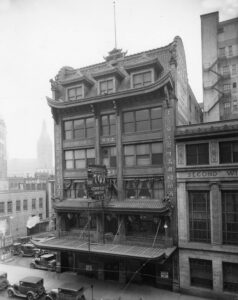
“Places of Their Own” aims to document and share the personal narratives about Chinese immigrants in Milwaukee, Wisconsin, and how they strived for survival and success through family
businesses. The project will engage the Organization of Chinese Americans-Wisconsin to identify community members who have important stories to tell and yet to find a channel to share. The oral histories will be contextualized using family archives and architectural research to write place-based Chinese American histories. As the first oral history project dedicated to preserving Chinese American history in Wisconsin, it will provide crucial knowledge of Asian American History for K-12 education in the state and guide the future preservation of Chinese American historic resources in Milwaukee.
Project Leader:
Hongyan Yang, PhD is a scholar of the built environment working at the intersection of architectural history, Asian American history, and ethnic foodways. Her interdisciplinary research focuses on how Asian immigrants’ cooking traditions and cultural sensibilities invest new meanings to the cultural landscapes in the United States. Yang is the recipient of several awards, including the Sophie Coe Prize Honorable Mention, the Vernacular Architecture Forum Ambassadors Award, and the American Pacific Coast Geographers Committee Award for Excellence in Area Studies. Her recent work is featured in American Chinese Restaurants (2020) and Routledge Handbook of Food in Asia (2019). https://www.yanghongyan.com
Voices of West Baltimore:
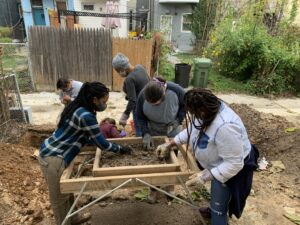 The goals of the project are to both provide former students with training and understand more about the community through their eyes. We want to record their telling of the history of neighborhood. We will ask questions about people’s experiences in the community and what the neighborhood looked like and how it has changed. We are interested in the dynamics of health, diet, representation, identity, employment, and infrastructure, as well as the current needs of the neighborhoods. These questions are crucial for understanding how historic preservation initiatives can best be used to serve the community. Further, we seek to understand how to provide access to recent historical research and how to better present the interpretations of this neglected but amazing heritage. Local students and community members will conduct the oral histories and further their skills in anthropology and community archaeology.
The goals of the project are to both provide former students with training and understand more about the community through their eyes. We want to record their telling of the history of neighborhood. We will ask questions about people’s experiences in the community and what the neighborhood looked like and how it has changed. We are interested in the dynamics of health, diet, representation, identity, employment, and infrastructure, as well as the current needs of the neighborhoods. These questions are crucial for understanding how historic preservation initiatives can best be used to serve the community. Further, we seek to understand how to provide access to recent historical research and how to better present the interpretations of this neglected but amazing heritage. Local students and community members will conduct the oral histories and further their skills in anthropology and community archaeology.
Project Leader:
Adam Fracchia is a historic archaeologist and assistant research professor at the University of Maryland, College Park, who studies the roots of inequality in Baltimore. One of my research goals is to understand the history of West Baltimore as told by the residents. University students from Baltimore and nearby schools as well as community members will help collect the oral histories. anth.umd.edu/about-us/archaeology-baltimore
Black Folk and Our Food: Extracting Traumatic Memory Hidden in Unwritten Family Recipes through Oral Histories:
Steeped in the West African tradition of the griot, the kitchens of African Americans have long been a place where recipes and inadvertently, oral histories, have been shared. Through my project, I want to capture the innate stories of African American families and their histories as well as document the unwritten recipes discussed and prepared during the oral histories. The goal of this project is to use orally transmitted recipes as the vehicle to deliver taboo family stories to better understand the functionality and adaptability of African American families. Recordings collected will be part of a mini-documentary and digital cookbook.
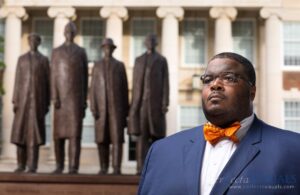
Project Leader:
You can find Andre L. Taylor in the intersection of story gathering and storytelling. Before becoming the oral historian at the College of William & Mary, Andre spent more than 15 years as a print journalist. Andre is a proud graduate of North Carolina Agricultural and Technical State University and earned a bachelor’s of arts in history before earning a master’s of arts in public history from NC State University. Andre is now entering his first year in the American Studies PhD program at William & Mary. Andre and his wife, Andrea, reside in Virginia with the twin daughters.
